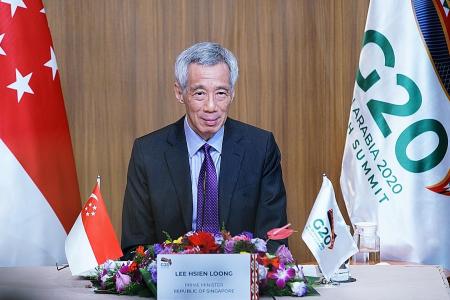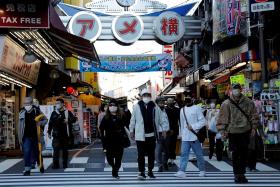G-20 leaders vow to intensify efforts to protect lives, jobs
They are also committed to an inclusive global recovery and combating climate change
While countries around the world grappled with a surge in Covid-19 infections, leaders of major economies yesterday pledged to step up efforts to safeguard lives and jobs, and to widen social safety nets.
Many stressed the need to also ensure that the global recovery is inclusive and sustainable, and to combat climate change, as the two-day Group of 20 (G-20) Riyadh summit, held virtually, came to a close.
The leaders, whose economies account for 90 per cent of the world's output and two-thirds of its population, vowed to "spare no effort" in ensuring the equitable distribution of vaccines globally and reaffirmed support for debt-laden poor countries, in a joint communique.
The G-20 has brought together the leaders of 19 countries and the European Union since they convened to coordinate a response to the 2008 global financial crisis. The current crisis is the first major recession confronting it since then.
Singapore was invited as a guest this year by host Saudi Arabia.
The weekend's discussions focused on the battle against the coronavirus - which has infected more than 55 million and killed 1.3 million - cooperation on vaccines, reviving a global economy hit by travel restrictions and lockdowns, as well as safeguarding the planet.
Prime Minister Lee Hsien Loong, who spoke, said that even as the world grapples with the crisis, Covid-19 will be over one day and an eye must be kept on the future. He suggested two areas of focus.
One, strengthen social resilience.
Many countries were facing severe stresses before Covid-19, with nativist and protectionist sentiments growing, fuelled by rising inequality and technological disruption, he noted. "Left on their own, these fault lines will only widen. To remedy this, we need to retain and create good jobs for our people."
More investment must also be made in merit goods such as education, public housing and public health, as well as in strengthening social safety nets, he added.
"These measures will give the less privileged a larger share of the fruits of progress, and a stronger stake in society," he said, citing Singapore's investments on wages and reskilling.
Two, the economic disruption should be an opportunity to redouble efforts for a sustainable future.
Mr Lee said Singapore is committed to addressing climate change together with other countries. It is pursuing a green recovery and transitioning to a low-carbon economy, promoting clean technology, low emission solutions and green finance, and working with partners on carbon markets and clean energy import.
"But as a small country, Singapore will not be able to stop climate change on our own. We need to work together with others," he said.
Get The New Paper on your phone with the free TNP app. Download from the Apple App Store or Google Play Store now


